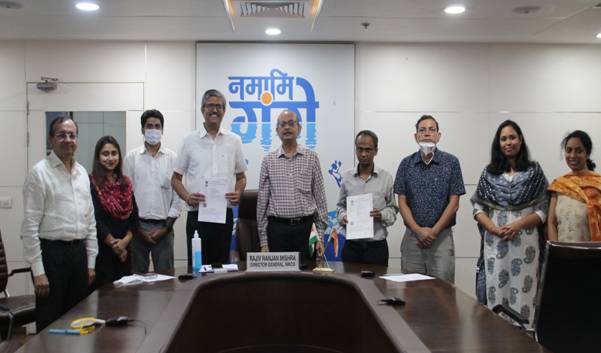
- Self-Study Guided Program o Notes o Tests o Videos o Action Plan

In India, untreated faecal sludge and urban sewage are the primary source of water pollution, particularly in the cities around Ganges. Under Prime Minister’s visionary initiative, the Swachh Bharat Mission, more than 62 lakh toilets are built. Half of these toilets rely on on-site sanitation system (OSS). Managing the waste collected from these toilets is the next big challenge for India. Considering these challenges, systematic capacity building initiatives need to be undertaken to build the skill and knowledge of the Government, Urban Local Body (ULB) officials, STP/FSTP Operators, Sanitary workers, entrepreneurs, NGO professionals and other stakeholders involved in the FSSM sector across India.
To bridge this gap, National Mission of Clean Ganga (NMCG) has signed an MoU with Water, Sanitation and Hygiene Institute (WASH Institute) to conduct a series of trainings to enhance the quality of service of officials in Urban Local Bodies (ULBs). This MoU is also to efficiently address FSSM issues in towns and cities of the Ganga Basin. The project will be funded by USAID and supported by The Bill and Melinda Gates Foundation. It aims to improve preparedness towards FSSM (faecal sludge and septage management) and Wastewater Management in Indian towns and cities.
As a first step in this collaboration, a webinar followed by two batches of detailed online trainings have already been conducted starting off with the state of Uttar Pradesh covering 20 ULBs. Many more such trainings are planned to cover the Ganga basin states – West Bengal, Jharkhand, Bihar, Uttarakhand and Uttar Pradesh. Some trainings are also planned in Vijaywada, Bhubaneshwar, Udaipur, Pune, Aurangabad, Chennai and Hyderabad. The training will include orientation training, Integrated Waste Water Management, Exposure visits to Co-treatment sites, certification courses for STP operators and various advanced trainings on FSSM.
Congratulating WASH institute on their efforts towards skill development in FSSM, Shri Rajiv Ranjan Mishra, Director General, NMCG said, “There is a huge demand of skilled workforce in FSSM. These tie-up with WASH institute will help building skilled work force in the area of water and sanitation management.” The MoU was signed between Shri Binod Kumar, Director Coordination, NMCG and Shri Rajesh Pai, Sr. Technical Advisor, WASH Institute. Shri Jagmohan Gupta, Advisor, NMCG and Shri Ashok Kumar Singh, Executive Director (Projects), NMCG were present at the event.

The overall outcome of the capacity building project is envisaged to be that Urban Local Bodies will efficiently address FSSM issues in their cities. Also, ULBs will use data driven planning, execution and management of WASH delivery through the creation of knowledge management database. The training courses are designed to strengthen basic understanding of FSSM sector encompassing technical, policy and regulatory and financial aspects.
*******
BY/AS
In India, untreated faecal sludge and urban sewage are the primary source of water pollution, particularly in the cities around Ganges. Under Prime Minister’s visionary initiative, the Swachh Bharat Mission, more than 62 lakh toilets are built. Half of these toilets rely on on-site sanitation system (OSS). Managing the waste collected from these toilets is the next big challenge for India. Considering these challenges, systematic capacity building initiatives need to be undertaken to build the skill and knowledge of the Government, Urban Local Body (ULB) officials, STP/FSTP Operators, Sanitary workers, entrepreneurs, NGO professionals and other stakeholders involved in the FSSM sector across India.
To bridge this gap, National Mission of Clean Ganga (NMCG) has signed an MoU with Water, Sanitation and Hygiene Institute (WASH Institute) to conduct a series of trainings to enhance the quality of service of officials in Urban Local Bodies (ULBs). This MoU is also to efficiently address FSSM issues in towns and cities of the Ganga Basin. The project will be funded by USAID and supported by The Bill and Melinda Gates Foundation. It aims to improve preparedness towards FSSM (faecal sludge and septage management) and Wastewater Management in Indian towns and cities.
As a first step in this collaboration, a webinar followed by two batches of detailed online trainings have already been conducted starting off with the state of Uttar Pradesh covering 20 ULBs. Many more such trainings are planned to cover the Ganga basin states – West Bengal, Jharkhand, Bihar, Uttarakhand and Uttar Pradesh. Some trainings are also planned in Vijaywada, Bhubaneshwar, Udaipur, Pune, Aurangabad, Chennai and Hyderabad. The training will include orientation training, Integrated Waste Water Management, Exposure visits to Co-treatment sites, certification courses for STP operators and various advanced trainings on FSSM.
Congratulating WASH institute on their efforts towards skill development in FSSM, Shri Rajiv Ranjan Mishra, Director General, NMCG said, “There is a huge demand of skilled workforce in FSSM. These tie-up with WASH institute will help building skilled work force in the area of water and sanitation management.” The MoU was signed between Shri Binod Kumar, Director Coordination, NMCG and Shri Rajesh Pai, Sr. Technical Advisor, WASH Institute. Shri Jagmohan Gupta, Advisor, NMCG and Shri Ashok Kumar Singh, Executive Director (Projects), NMCG were present at the event.

The overall outcome of the capacity building project is envisaged to be that Urban Local Bodies will efficiently address FSSM issues in their cities. Also, ULBs will use data driven planning, execution and management of WASH delivery through the creation of knowledge management database. The training courses are designed to strengthen basic understanding of FSSM sector encompassing technical, policy and regulatory and financial aspects.
*******
BY/AS